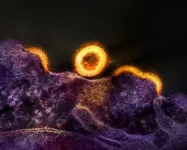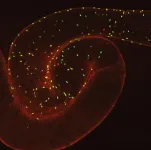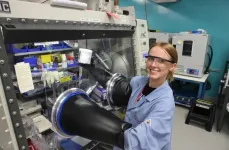In mid-2023, the SWOG S1826 phase 3 trial in advanced Hodgkin lymphoma reported highly positive primary results earlier than expected, after the trial’s second planned interim analysis found the preset threshold for efficacy had already been reached.
Now, a follow-up analysis with additional data – a median follow-up of 2.1 years – confirms the durability of those initial findings: among the 970 newly diagnosed adolescents and adults randomized to the trial, those who received a combination of nivolumab plus AVD chemotherapy (N-AVD) had a significantly lower risk of cancer progression or death than those treated with a standard combination of brentuximab vedotin plus AVD (BV-AVD). Results are published in the New England Journal of Medicine.
“This new analysis with more patient follow-up is critical to understanding the clinically meaningful benefit obtained from N-AVD compared to BV-AVD,” said Michael LeBlanc, PhD, lead biostatistician on the S1826 study. LeBlanc is group statistician of the SWOG Cancer Research Network, director of the SWOG Statistics and Data Management Center, and professor of biostatistics at Fred Hutch Cancer Center.
The two-year progression-free survival rate was 92 percent on the N-AVD arm compared to 83 percent on the BV-AVD arm. This benefit was generally consistent across pre-specified patient subgroups, including by patient age, disease stage, and International Prognostic Score.
Overall, the N-AVD treatment was also better tolerated than BV-AVD (AVD chemotherapy is a combination of doxorubicin/Adriamycin, vinblastine, and dacarbazine). On the N-AVD arm, fewer patients stopped treatment early (7.6 percent of patients versus 12.0 percent) and fewer deaths occurred during treatment (0.6 percent of patients versus 1.7 percent). The rates of most side effects were also lower on the N-AVD arm.
The differences in toxicity between the two treatments were particularly pronounced in patients older than 60 years of age. On the BV-AVD arm, this group of patients had a higher mortality rate than younger patients, and roughly one-third had to discontinue treatment early because of toxicity, whereas patients older than 60 on the N-AVD arm did not experience significantly higher morbidity or mortality rates than their younger counterparts. Notably, less than 1 percent of patients received radiation therapy.
The S1826 trial is supported and sponsored by the National Cancer Institute (NCI), part of the National Institutes of Health (NIH), and led by the SWOG Cancer Research Network, in collaboration with the Children’s Oncology Group (COG) and with participation from other NCI-funded National Clinical Trials Network (NCTN) groups. It is the largest classic Hodgkin lymphoma study ever conducted in the NCTN and reflects a successful collaboration between pediatric and adult lymphoma investigators, enabling earlier evaluation of promising novel therapies in adolescents with Hodgkin lymphoma in frontline treatment.
S1826 was funded by the NIH/NCI through grants U10CA180888, U10CA180819, U10CA180821, U10CA180820, U10CA180863, and UG1CA189955, with additional support provided by Bristol-Myers Squibb (BMS) through a Cooperative Research and Development Agreement between the NCI and BMS. Brentuximab vedotin was provided to the NCI-funded Canadian Cancer Trials Group by Seagen.
In addition to Dr. LeBlanc, authors on the publication include corresponding author Jonathan W. Friedberg, MD, MMSc, Wilmot Cancer Institute, University of Rochester; first author Alex F. Herrera, MD, City of Hope Comprehensive Cancer Center; Sharon M. Castellino, MD, MSc, Aflac Cancer and Blood Disorders Center, Children's Healthcare of Atlanta, Emory University Hospital/Winship Cancer Institute; Hongli Li, MS, SWOG Statistics and Data Management Center; Sarah C. Rutherford, MD, Weill Cornell Medicine; Andrew M. Evens, DO, MBA, MSc, Rutgers Cancer Institute of New Jersey; Kelly Davison, MD, PhD, McGill University Health Centre; Angela Punnett, MD, SickKids Hospital; Susan K. Parsons, MD, MRP, Reid R. Sacco AYA Cancer Program, Tufts Medical Center; Sairah Ahmed, MD, MD Anderson Cancer Center; Carla Casulo, MD, Wilmot Cancer Institute, University of Rochester; Nancy L. Bartlett, MD, Siteman Cancer Center, Washington University; Joseph M. Tuscano, MD, UC Davis Comprehensive Cancer Center; Matthew G. Mei, MD, City of Hope Comprehensive Cancer Center; Brian T. Hess, MD, Medical University of South Carolina; Ryan Jacobs, MD, Carolinas Medical Center/Levine Cancer Institute; Hayder Saeed, MD, Moffitt Cancer Center; Pallawi Torka, MD, Memorial Sloan Kettering Cancer Center; Boyu Hu, MD, Huntsman Cancer Institute, University of Utah; Craig Moskowitz, MD, Sylvester Comprehensive Cancer Center, University of Miami; Supreet Kaur, MD, University of Texas HSC at San Antonio; Gaurav Goyal, MD, University of Alabama at Birmingham; Christopher Forlenza, MD, Children’s Hospital Los Angeles; Andrew Doan, MD, Children’s Hospital Los Angeles; Adam Lamble, MD, Seattle Children’s Hospital; Pankaj Kumar, MD, Illinois CancerCare; Saeeda Chowdury, MD, Prisma Health Cancer Institute – Eastside; Brett Brinker, MD, MS, Cancer & Hematology Center - W Michigan; Namita Sharma, MD, Geisinger Community Medical Center - Hematology and Oncology; Avina Singh, MD, Fairview Ridges Hospital, Minnesota Oncology; Kristie A. Blum, MD, Emory University Hospital/Winship Cancer Institute; Anamarija M. Perry, MD, University of Michigan; Alexandra Kovach, MD, Children’s Hospital Los Angeles; David Hodgson, MD, MPH, Princess Margaret Cancer Centre; Louis S. Constine, MD, Wilmot Cancer Institute, University of Rochester; Lale Kostakoglu Shields, MD, NYU Langone; Anca Prica, MD, Princess Margaret Cancer Centre; Hildy Dillon, MPH, SWOG Cancer Research Network; Richard F. Little, MD, National Cancer Institute, Cancer Therapy Evaluation Program; Margaret A. Shipp, MD, Dana-Farber Cancer Institute; Michael Crump, MD, Princess Margaret Cancer Centre; Brad Kahl, MD, Siteman Cancer Center, Washington University; John P. Leonard, M, Weill Cornell Medicine; Sonali M. Smith, MD, University of Chicago; Joo Y. Song, MD, City of Hope Comprehensive Cancer Center; and Kara M. Kelly, MD, Roswell Park Comprehensive Cancer Center.
SWOG Cancer Research Network is part of the National Cancer Institute's National Clinical Trials Network and the NCI Community Oncology Research Program and is part of the oldest and largest publicly funded cancer research network in the nation. SWOG has 20,000 members in 45 states and nine other countries who design and conduct clinical trials to improve the lives of people with cancer. SWOG trials have directly led to the approval of 14 cancer drugs, changed more than 100 standards of cancer care, and saved more than 3 million years of human life. Learn more at swog.org, and follow us on Twitter (X) at @SWOG.
About COG
COG (childrensoncologygroup.org), a member of the NCI National Clinical Trials Network (NCTN), is the world’s largest organization devoted exclusively to childhood and adolescent cancer research. COG unites over 10,000 experts in childhood cancer at more than 200 leading children’s hospitals, universities, and cancer centers across North America, Australia, New Zealand, and Saudi Arabia in the fight against childhood cancer. Today, more than 80% of the 15,000 children and adolescents diagnosed with cancer each year in the United States are cared for at COG member institutions. Research performed by COG institutions over the past 50 years has transformed childhood cancer from a virtually incurable disease to one with a combined 5-year survival rate of 86%. COG’s mission is to improve the cure rate and outcomes for all children with cancer.
Reference:
AF Herrera, et al. “Nivolumab+AVD in Advanced-Stage Classic Hodgkin’s Lymphoma.” N Engl J Med 2024; DOI: 10.1056/NEJMoa2405888
END






